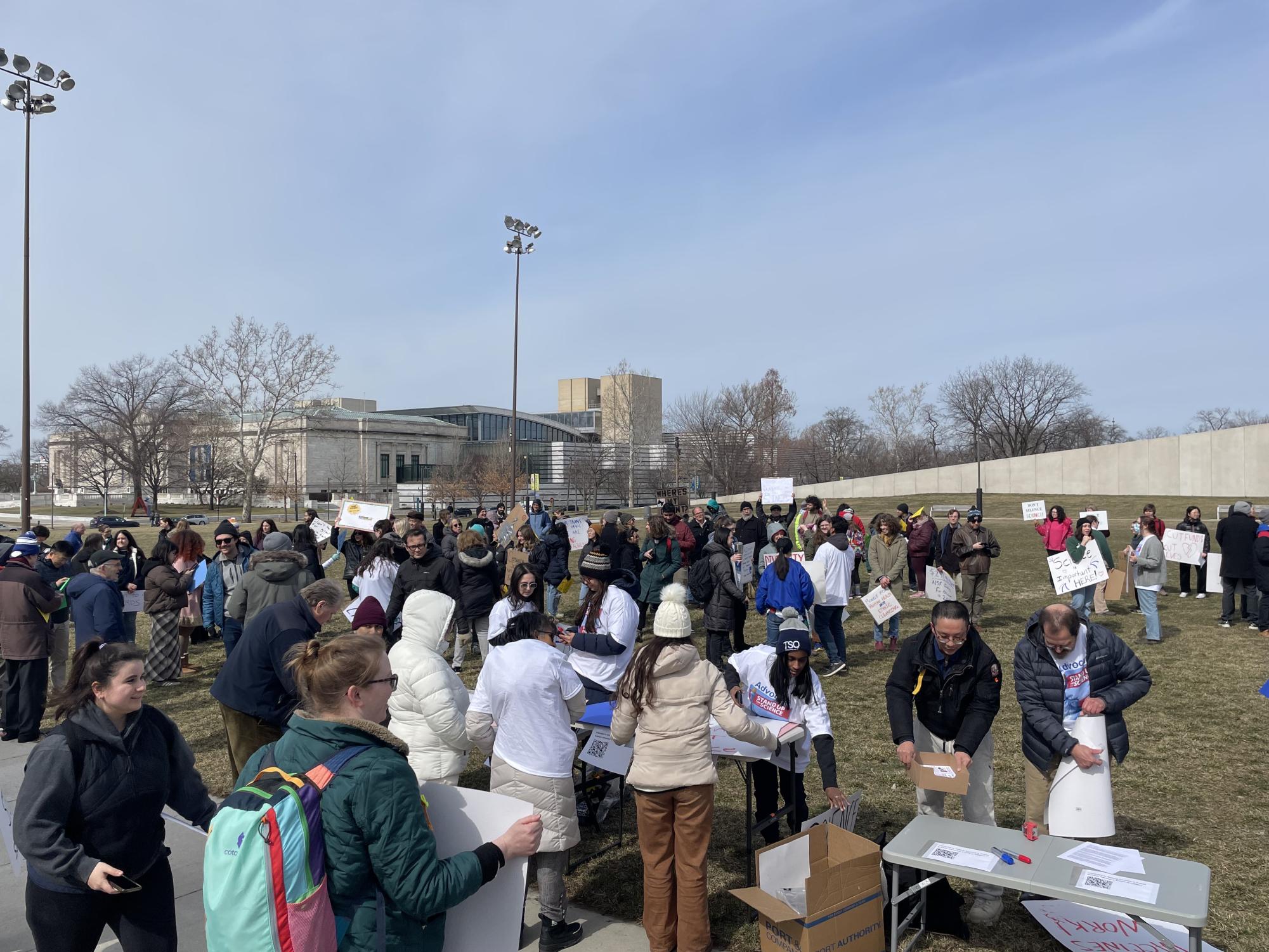On March 7, members of the Case Western Reserve University community participated in a walkout to support and defend science against threats from President Donald Trump’s administration. The walkout, Stand Up For Science, took place in more than 30 cities across the United States, including Washington, Cleveland and Columbus, Ohio. National organizers cite several policy goals of the walkout, such as securing and expanding scientific funding and defending diversity, equity and inclusion in STEM fields.
The walkout at CWRU was primarily organized by members of the Department of Biomedical Engineering and the Biomedical Engineering Society (BMES). Because the event occurred on campus, organizers were not allowed to use sound amplification equipment. Instead, volunteers wearing shirts that read “Advocate” led chants every 10-15 minutes and circulated throughout the crowd with pamphlets outlining the goals of the walkout.
One of the advocates there was a CWRU student representing BMES, who requested to remain anonymous. They got involved with organizing the event because they saw how national policy has affected the CWRU population. “A lot of people are getting laid off, a lot of programs are cutting the number of PhD students they get,” they said. “In my lab, a lot of experiments have been stopped, so I feel like politics and science should be kept separate spheres.”
They hope that walkout attendees will take what they’ve learned and challenge others to consider the far-reaching impacts of science. “People who come will mostly be in favor of standing up for science, but there would be a lot of people who are in between opinions,” they added. “It would be very amazing to have someone go out of here or walk by and just see all of this and be willing to spark conversations with others who are less open on the topic.”
Jürgen Bosch, a scientist at the CWRU School of Medicine and co-founder of a biotech startup, hopes the protest will bring more attention toward the damage being done to science by the Trump administration. “It will be to the detriment of the general population of the U.S.—have it cancer treatment for anybody, Republican or Democrat, doesn’t matter—people die if you don’t have the resources available for either educating people or doing research,” he said. Bosch mentioned the importance of research in developing the accepted understanding of how the world works. “Scientists have the advantage that we base our stuff on facts, and it’s not a made-up idea of someone,” he added. “We have peer review, so various people validate your results from different continents or different institutions. And, by doing so, we enrich and force what is correct.”
Another attendee, Kate Zerefos, is employed at the Cleveland Clinic as an undergraduate researcher. Her lab is funded by grants from the National Institutes of Health (NIH). She heard about the walkout through fellow researchers and decided to attend to express solidarity against threats to scientific and clinical research. “Even a pause or a slight cut to scientific funding could have really catastrophic effects, even if you think that there is something that needs to change in NIH funding,” she said. “A slight pause or change in the grant cycle could impact the next grant cycle, and then the grant cycle after that, and that could affect a whole generation of researchers, even if that wasn’t the intended effect.”
David Wilson, a professor of biomedical engineering and event organizer, agrees that there is an attack on science which could have far-reaching impacts. “The way things are going, it could really impact the United States in the future,” he said. “A lot of innovations from NIH-funded research have helped save lives. Over 99% of drugs can be linked back to NIH-funded research. and here at Case Western we’re developing all kinds of wonderful things. There’s a real economic impact.” Wilson hopes that event attendees will talk to their friends and family and push for legislative change. “Going into the future, we need to make sure that people vote in a way to support science, and I’m asking everybody to call our representatives,” he said. “I’m hoping that the representatives’ phone lines are clogged after the event.”
Wilson expressed hope that CWRU will continue to unite in support of science. “Our school of medicine is one of the most outstanding ones in the country. Our Department of Biomedical Engineering, we are quite proud of that, we do all kinds of innovative things,” he said. “We cannot be strangled by policy.”



